FutureLaw 2019 — How Will Technology Shape the Future of Law?
In early April, CodeX, Stanford Law School’s Center for Legal Informatics, hosted its seventh annual FutureLaw conference focusing on the way technology is changing the legal profession and the law itself. Bringing together academics, entrepreneurs, lawyers, investors, policymakers, and engineers, the conference presented a unique opportunity for legal tech innovators from around the world to connect and exchange ideas on the legal innovation movement.
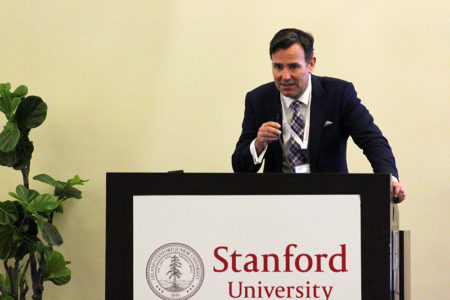
“FutureLaw is always one of the highlights of our work at CodeX,” said Roland Vogl, Executive Director of CodeX. “Technology is coming to the law from many different angles, and it plays a key role in the new paradigm of legal services. To ignore technology and keep on doing business as usual is a huge risk for any lawyer.”
Technology Can Help Build Community
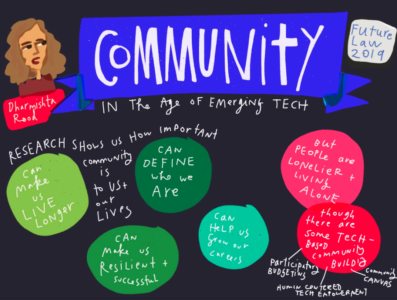
More than 300 registrants attended the conference to discuss the future of legal technology and network with other lawyers and technologists. The event kicked off with an opening keynote by Dharmishta Rood, with Singularity University, on the future of community and the potential for technology and virtual tools to develop new communities that are relevant to present-day life and work.
“More than half of the world lives in urban areas, but more people than ever before now live alone,” said Rood. “In 2014, a quarter of all Americans said they had no community members, in the 1980s only one in ten felt that way.”
Watch the full video of of Rood’s talk on community
Transforming Justice
Following the keynote, the conference dove head first into a conversation on how legal tech will transform the structure of the civil justice system with a panel moderated by Stanford Law School Professor and Associate Dean for Strategic Initiatives David Freeman Engstrom. Panelists — Hon. Lee Rosenthal, Chief Judge of the United States District Court for the Southern District of Texas; Pamela Karlan, Co-Director of
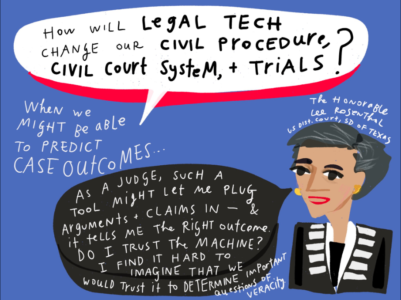
Stanford Law School’s Supreme Court Litigation Clinic and Professor of Law; Elizabeth Cabraser, Partner at Lieff Cabraser Heimann & Bernstein; and Jonah Gelbach, Professor of Law at University of Pennsylvania Law School — discussed the likelihood and potential of utilizing Artificial Intelligence (AI) to lead to legal singularity, the point at which uncertainty in the law is eliminated and legal decisions become perfectly predictable (a state they coined “the legal singularity”).
The members of the panel talked about when and how AI is useful, how it may change the practice of law, and the moral issues involved.
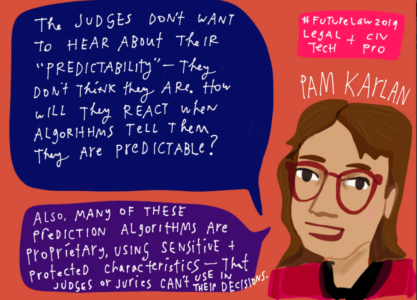
“At what level do I trust machines on degree of believability, plausibility, reliability, all things that humans learn through years of social experience, and does this vary based on questions of fact (“the light was green!”) and questions of expertise (“I am a scientist”)?” said Rosenthal.
“Judges don’t want to be told how we think they will rule,” said Karlan, on the issue of predicting judicial decisions. “The integrity of the judiciary is already poisoned by the administration’s appointment of judges. If algorithms add on to that, we are in trouble.”
Watch the full video of the panel discussion
Traditional Legal Education vs. the Modern Lawyer
The next panel of the day, moderated by Emeritus Dean of Northwestern University Pritzker School of Law Daniel Rodriguez, discussed the future of legal education and how to best prepare the 21st century lawyer. The panelists included Jay Mandal, CodeX Fellow; Linda Alinda-Ikanza, Head of Trial Advocacy Skills and Moots at the Law Development Centre (where?); Alice Armitage, Professor and the Director of Law & Technology at UC Hastings; and Dirk Hartung, Executive Director of Legal Technology at Bucerius Law School.
The panel began with a discussion of the clash between traditional legal education and the needs of the modern lawyer.
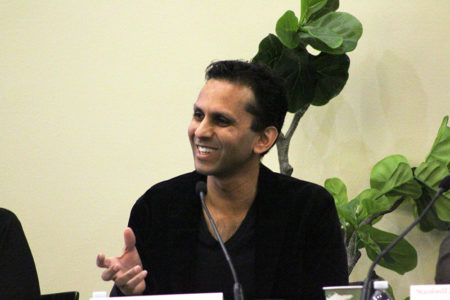
“Law school graduates need three things: deep knowledge of the law, deep industry expertise, and a deep understanding of business processes,” said Mandal. “Lawyers are not helpful when they act as risk-averse gatekeepers who present legal options without an informed opinion.”
Mandal added that currently some law schools are graduating lawyers who are ill-equipped and require years of additional training by the organizations that hire them. When discussing positive changes law schools could make, Mandal focused on the need for law schools to offer interdisciplinary teaching, experiential learning and specific knowledges in other disciplines. He additionally highlighted how Stanford Law School is already making these changes through courses such as Legal Informatics, Computational Law and Startup Bootcamp for Law.
Watch the full video of the legal education discussion
Government as a Platform
That afternoon, Jameson Dempsey, CodeX Residential Fellow, moderated a panel covering several national, transnational, and private efforts from around the world that have achieved some progress on making legislation and rules machine consumable. The panel included Pia Andrews, Executive Director, Digital Government Policy and Innovation for the Department of Finance, Services and Innovation; Meng Weng Wong, Co-Founder, Legalese.com; Leila Banijamali, Co-Founder & CEO, Symbium; and Matti Schneider, International Lead, OpenFisca.
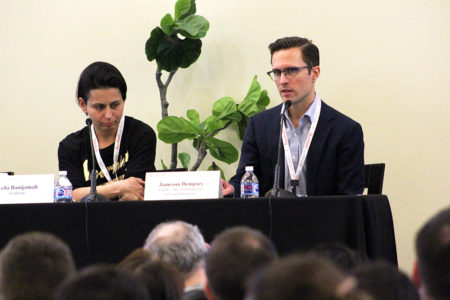
Discussing the benefits of government as a platform for utilizing computational law to make law and legal processes more efficient and accessible, Dempsey described how computational law “allows us to facilitate interdisciplinary efforts, leaves less room for misinterpretation and increases transparency and appealability.”
In response to Dempsey’s question as to how to best achieve government as a platform, Andrews emphasized “redefining what it means to be a modern public servant” and “not outsourcing tech thinking to IT.”
Watch the full video of of panel on technology & legislation
The Future of Open Law
The last panel of the day discussed the dramatic rise in free and open source legal resources over the past few years and featured Margaret Hagan, Director, Stanford Legal Design Lab; Jason Tashea, Legal Affairs Writer, ABA Journal; Adam Ziegler, Director, Library Innovation Lab, Harvard Law School Library; Mike Lissner, Executive Director, Free Law Project; Nikki Zeichner, Innovation Specialist; and Jonathan Pyle, Contract Performance Officer, Philadelphia Legal Assistance.
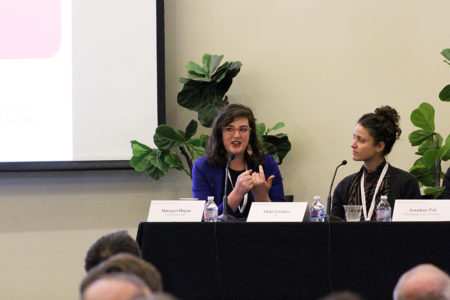
“It’s about getting the right people in the room,” said Hagan on increasing accessibility and diversity in open law projects. “Let’s go outside of institutional arrangements and ask a wider set of community members where movements can go.”
Hagan later added that private players, especially law firms, can contribute to open law projects by sharing their data to enhance open-source legal resources.
The event concluded with a closing keynote by GitHub Chief Business and Strategy Officer Julio Avalos who discussed the current issues with technology and the legal system and how the legal and tech professions might move forward together.
